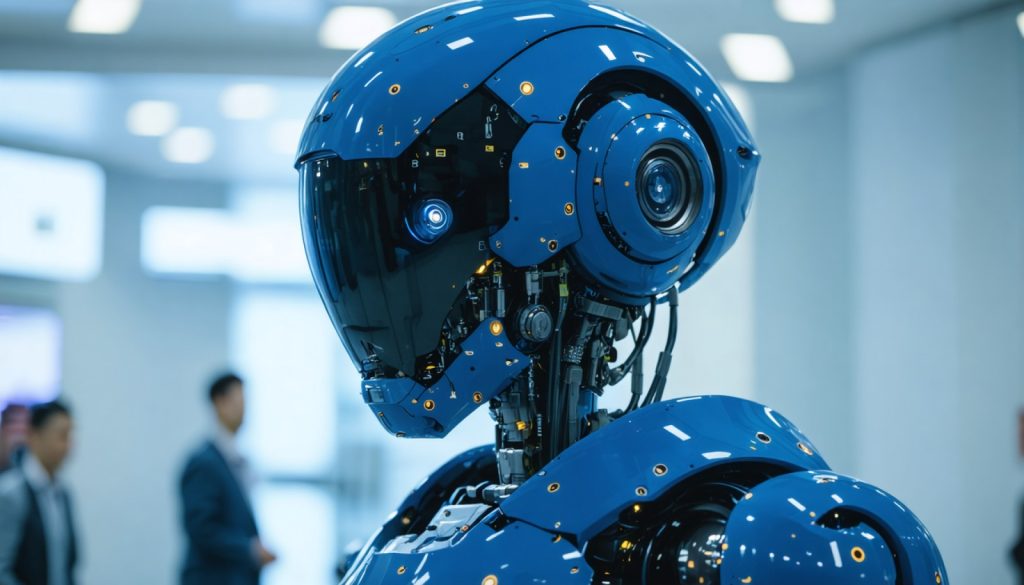
- Artificial Intelligence is expanding beyond traditional roles like recommendation engines and automated responses, revolutionizing various fields.
- AI accelerates drug discovery by analyzing vast data sets and molecular configurations, significantly reducing the time required for finding new pharmaceuticals.
- In beekeeping, AI enhances hive monitoring, promoting colony health and alerting beekeepers to potential threats, thereby supporting ecosystem balance.
- This evolution showcases AI’s transition from interactive tools to indispensable partners, integrating deeply into essential life aspects.
- AI’s new applications offer promising potential for enriching human lives with greater health, connectivity, and environmental stewardship.
An audacious evolution is unfolding in the realm of artificial intelligence, where the ordinary chatbots of yesterday are mere echoes in the grand tapestry of innovation. Imagine, for a moment, the insatiable hum of bees working in unison with a digital aide, an unseen partner optimizing their efforts for a world more abundant. Or picture the serene companionship provided to an elderly soul, as an intelligent entity offers both conversation and solace, bridging the gap between solitude and connection.
Artificial intelligence is breaking away from its conservative mold where recommendation engines and automated responses were its bread and butter. Today, AI exuberantly bursts onto new stages, each revealing novel possibilities. Beneath the surface of this revolution, it serves as an unseen hand, deftly weaving solutions to some of humanity’s most pressing challenges.
In the hallowed halls of science, AI emerges as a detective in the complex world of pharmacology, sifting through billions of data points to uncover new drugs. It parses through endless molecular configurations with the tireless dedication only a machine can muster, accelerating drug discovery processes that could once take decades, epitomizing the potential to save lives with unparalleled efficiency and speed.
Meanwhile, in the lush, buzzing environments created for the vital art of beekeeping, AI stands guard and guide. Advanced systems monitor hives, tracking the health and productivity of colonies, and alerting beekeepers to environmental threats or health anomalies. This digital supervision aids in preserving these tiny warriors, pivotal to our ecosystem’s balance.
This metamorphosis from mere interactive entities to indispensable partners illuminates a profound takeaway: AI, with its ever-expanding versatility, holds the potential to reshape essential aspects of life as we know it. As we witness AI branching beyond the cold, utilitarian functions, its applications unfold with a promising brilliance.
Those who embrace these avant-garde applications of AI aren’t just adopting technology; they’re forging pathways to futures where machines embolden people to live richer, healthier, and more connected lives. And in this harmonious dance of bits and humanity, the unpredictable journey of artificial intelligence continues to captivate and astonish.
The Next Frontier of Artificial Intelligence: Transforming Lives and Industries
Introduction to AI Applications
The landscape of artificial intelligence is rapidly evolving, moving beyond simple chatbots and recommendation engines to become a transformative force across numerous industries. AI is now playing a crucial role in areas like healthcare, agriculture, and companion robotics, offering innovative solutions to complex problems.
How AI Is Revolutionizing Drug Discovery
One of the most promising applications of AI is in the field of pharmaceuticals. AI systems, such as those using machine learning algorithms, are capable of analyzing vast datasets of molecular compositions and biological interactions. According to a study published in Nature Reviews Drug Discovery, AI can reduce the time required for drug discovery by predicting how potential drug molecules will interact with the body, thereby identifying viable candidates faster than traditional methods.
AI-Driven Beekeeping Innovations
AI technology is also transforming beekeeping by providing real-time monitoring of hives. Systems equipped with sensors track environmental conditions and hive health, alerting beekeepers to potential threats like diseases or pesticides early. As reported by the Bee Informed Partnership, these innovations help sustain bee populations and, consequently, the global food supply by ensuring pollination processes remain uninterrupted.
The Rise of AI Companionship
Beyond practical applications, AI is making significant strides in enhancing human interaction through companionship robots. These AI entities provide emotional support and social interaction to the elderly, effectively bridging the gap between solitude and social engagement. Research from the Journal of Medical Internet Research shows that AI companions can positively impact mental health by reducing loneliness and enhancing the quality of life for seniors.
Challenges and Ethical Considerations
As AI continues its forward march, several ethical considerations come to the fore. Issues of privacy, data security, and the potential for AI systems to reinforce existing biases are pressing concerns. According to the World Economic Forum, ensuring transparency in AI algorithms and maintaining rigorous ethical standards in their deployment remains crucial for realizing AI’s benefits while mitigating risks.
Future Trends and Predictions
Looking ahead, AI is set to integrate even further into daily life. The convergence of AI with other emerging technologies, such as IoT (Internet of Things) and blockchain, promises to unlock new possibilities across various sectors. Analysts from Gartner predict significant investment in AI developments, with ongoing advancements expected in autonomous vehicles, personalized medicine, and intelligent supply chain management.
Actionable Tips for Businesses and Individuals
1. Stay Informed: Keep abreast of the latest AI developments by subscribing to reputable tech journals and attending industry conferences.
2. Embrace AI Tools: For businesses, exploring AI solutions tailored to enhance operations can offer a competitive edge.
3. Prioritize Ethics: Implement ethical guidelines when developing or utilizing AI technologies to protect privacy and promote fairness.
Conclusion
Artificial intelligence represents a dynamic force reshaping our world. By understanding its potential and limitations, both individuals and organizations can harness AI to foster innovation, improve efficiency, and enhance the quality of life. For more insights on technological advancements and tips on leveraging AI, visit Forbes and The Verge.



